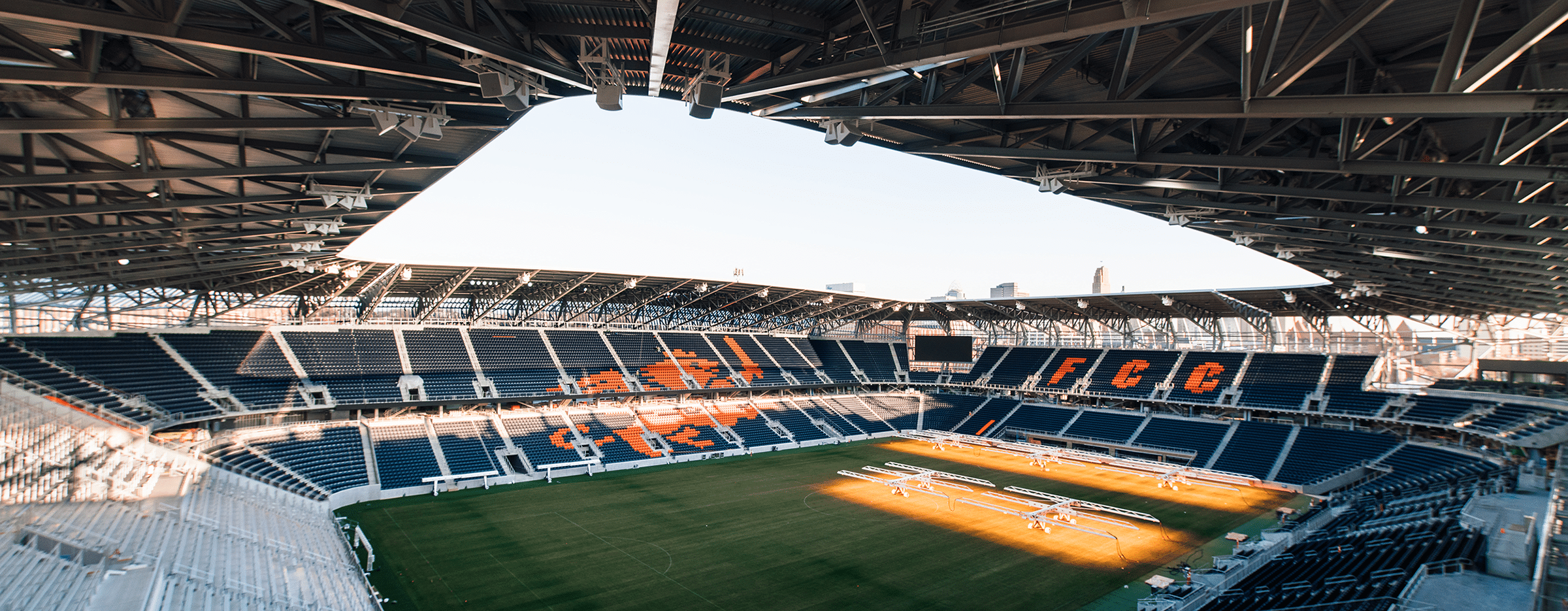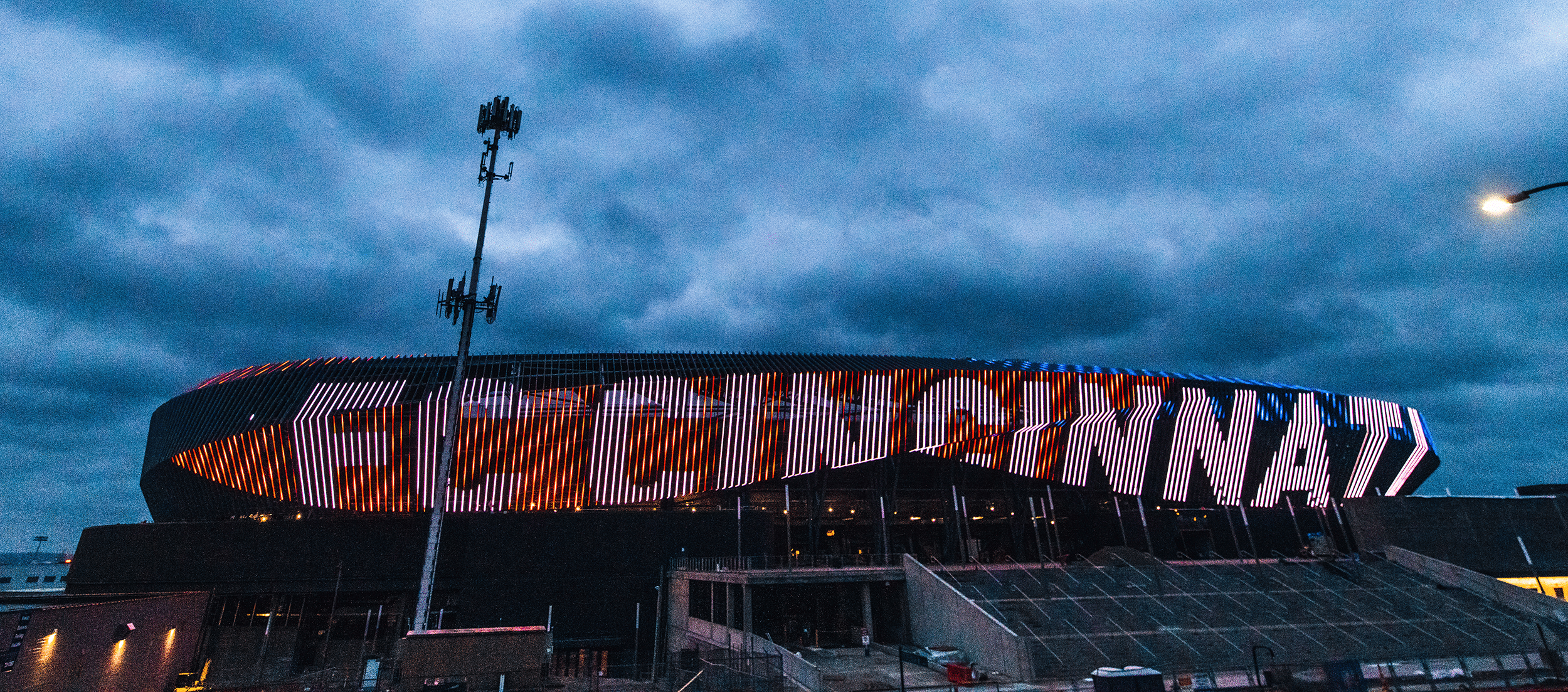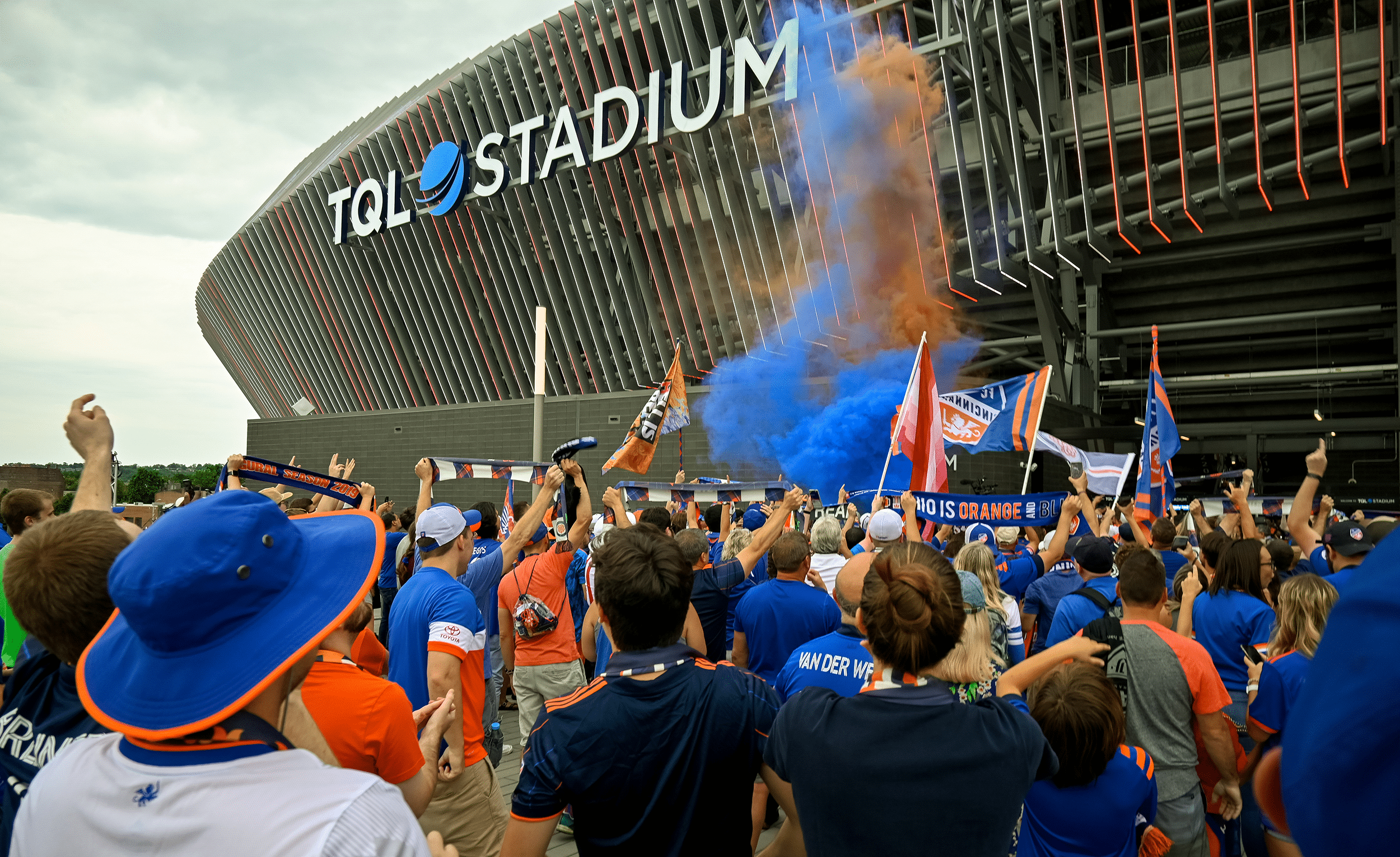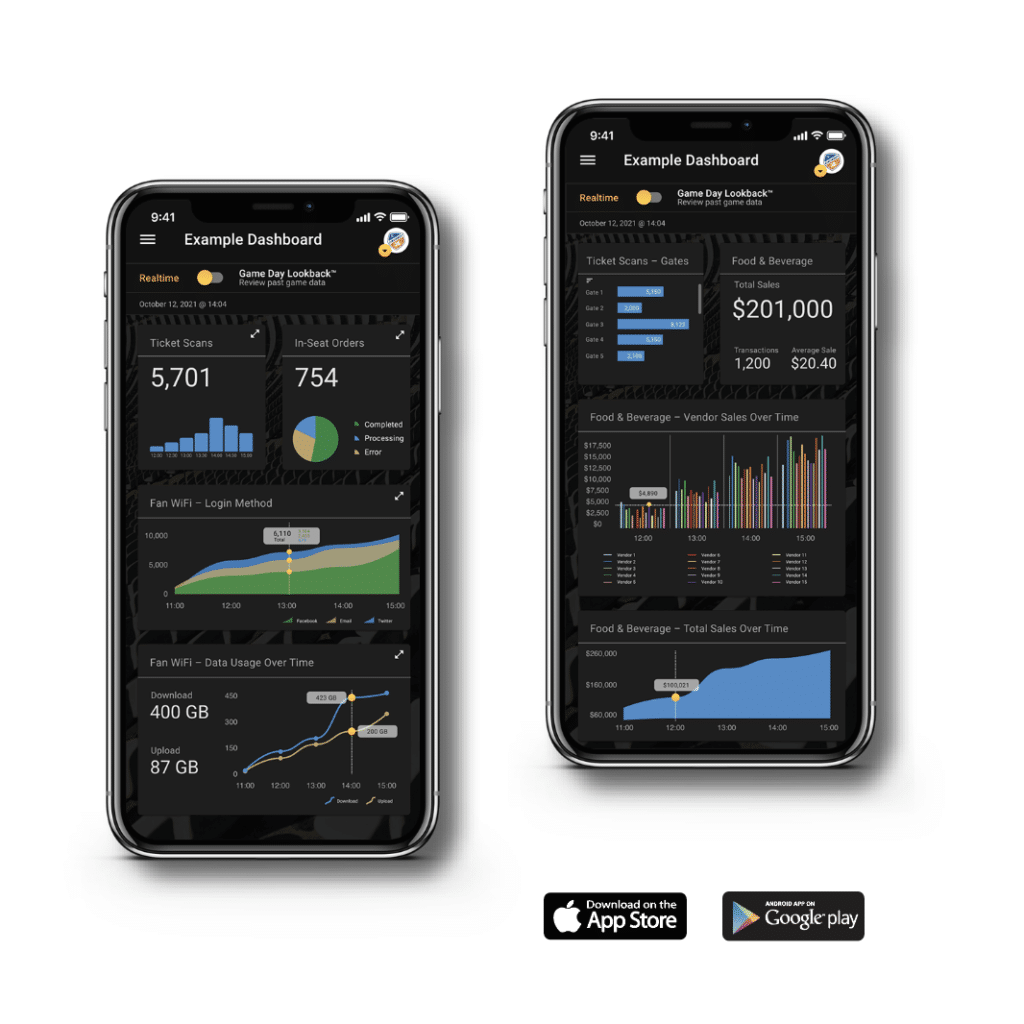FC Cincinnati's Game-Changing Approach to Technology
The Situation:
The FC Cincinnati (FCC) team rose through the ranks very quickly. In just a few years, the team went from the United Soccer League to Major League Soccer. Previously playing their games at the University of Cincinnati’s Nippert Stadium, this rapid ascent to the top meant they would need a forever home — a new stadium to call their own.
From a technology perspective, opening the $250 million TQL Stadium for a new team presented its challenges. For one, they were not a team with years of history behind them, so designing a stadium that would emulate who they wanted to be twenty years down the road would require planning. As such, an innovative, fan-oriented vision needed to be at the center of their technology strategy. Staying ahead of the curve and projecting solutions for fans and operations years in advance would be integral.
Scheduled to open early 2021, the timeline for stadium completion was incredibly short. With such a condensed window and unforeseen challenges due to the pandemic, FCC needed a technology owner’s representative — someone who could offer advanced subject matter expertise and help leadership navigate technology decisions with the club’s best interests at heart.
FCC had previously worked with multiple technology providers, but there was never a holistic, singular focus from any one provider. At one point, FCC was working with three different providers before choosing to consolidate and partner with Atomic Data. Regarding project challenges, Dan Lolli, vice president of facilities and stadium general manager at FCC said, “We wanted to make sure that we had a comprehensive IT solution for our entire company and didn’t continue down the path of siloing technology into different areas of our business. We were also trying to overcome the timeline, the monumental task of being a new team, and disrupting the market while differentiating ourselves in Cincinnati. We knew technology would be one of the ways to do it.”
For FCC, finding a partner who could develop solutions with technology at the forefront instead of as an afterthought was critical to the future success of the venue and the team.
When FCC leadership went to watch their team face off against Minnesota United FC (MNUFC) at Allianz Field in June 2019, they couldn’t help but notice the impressive technology solutions implemented throughout the stadium. Chris Wright, then CEO of MNUFC, met with FCC leadership before the game to outline their technology strategy and business relationship with Atomic Data. Atomic Data had represented MNUFC in all aspects of technology including building their entire Local Area Network, Wi-Fi, and phone system, implementing a mobile-first strategy, and making technology decisions with vendors, general contractors, and staff. “[We] experienced something that aligned with where we wanted to go,” said Meg Ryan, FCC’s chief marketing officer. “We really loved what they were doing in Minnesota and we wanted to be a part of that. As we were building our infrastructure, Atomic Data rose to the top.” Seeing these technology solutions in action prompted FCC to partner with Atomic Data in the development of TQL Stadium.

The Solution:
FCC initially brought in Atomic Data as owner’s technology representative. Responsibilities included reviewing drawings to validate technology designs on behalf of FCC, gathering business requirements from internal stakeholders, identifying technology providers who could meet those needs, drawing up budget estimates for each technology scope, consulting on the RFP and bid processes, and providing vendor recommendations for FCC. Atomic Data quickly became a trusted partner because they always kept FCC’s best interests at the forefront.
At the beginning of the project, FCC needed to finalize their Distributed Antenna System (DAS) strategy. A previous provider recommended that FCC build the DAS by investing its capital, ensuring a faster carrier onboarding process. Recognizing this as an ineffective long-term strategy, Atomic Data advised differently, explained accurate market conditions, and suggested issuing an RFP for a neutral host carrier. After a thorough bid and assessment process, Atomic Data recommended Mobilitie as a neutral DAS system provider. In this chosen business model, not only did FCC avoid substantial capital investments, but was also able to leverage the experience, expertise, and negotiating skills of Mobilitie to onboard carriers.
“It’s rare in the business world to have a true partner come to the table whose goal is to see you succeed. You don’t see that often, but that is absolutely the case with Atomic Data.”
– Meg Ryan, CMO of FC Cincinnati
FCC started to see that Atomic Data was invested in their success and, in turn, started leveraging Atomic Data’s technical expertise on all aspects of technology. Over time, Atomic Data’s responsibilities evolved to building the converged network. Using previous MLS and enterprise experience, Atomic Data was able to articulate best options, reduce overhead costs, and establish more efficient operations. As the relationship grew, Atomic Data eventually became the official information technology partner for FCC and started managing the technology at their front office and Mercy Health Training Center.

Implementation:
Technology implementation for TQL Stadium included building out the Wi-Fi network by installing 650 Aruba access points. Over 50% of the access points were installed underneath seats and the remaining were installed in the concourse, Back of House (BOH) operations area, suite level, press location, and concession stands — all supporting the new Wi-Fi 6 protocol.
As owner’s technology representative, Atomic Data also worked with Mobilitie to install 200+ antennas and VITEC to commission 325+ IPTV devices and 200+ point of sale devices for food, beverages, and concessions. Atomic Data also managed the video production control room implemented by Alpha Video and the installation of an LED scoreboard by Daktronics.
Throughout implementation, Atomic Data has saved FCC several million dollars. Savings were realized through value engineering and right-sizing technology recommendations, IDF room consultation, optimization of virtual infrastructure, enhanced RFP processes, and maintaining a laser-focus on user requirements and the business case.
“Atomic Data has been an instrumental, irreplaceable member of our stadium team. They are a trustworthy strategic partner, bring an ownership mindset, and are tireless in representing our interests.”
– Dennis Carroll, Chief Operating Officer at FC Cincinnati
But technology implementation didn’t come without its challenges. For one, the electrical and cabling trades experienced significant fallout during the COVID-19 pandemic, making it difficult for FCC and Atomic Data to complete all technology installations. From a project management perspective, however, Atomic Data was able to navigate this issue and notify stakeholders of risks well in advance. This included working with the general contractor to prioritize needs, expediting critical items, and quickly arranging supplemental labor to accommodate for staffing shortages.
With health and safety concerns on everyone’s mind, FCC also needed to prioritize and re-evaluate their strategy on ticketing and customer interaction. To prioritize the health of fans, Atomic Data installed touch-free pedestals instead of hand scanners at the main entrance of the stadium, where more than 60 percent of fans typically enter. “When we opened Allianz Field, we wanted to have people taking tickets with handheld scanners, to greet fans by looking them in the eyes,” said Yagya Mahadevan, Atomic Data’s enterprise project manager. “But the pandemic changed things. Now, no one wants to touch anything, so instead of hand scanners at TQL Stadium, we’ll have pedestals.” To further reduce points of friction, Atomic Data included extra Wi-Fi coverage for the main entrance.
These technology deployments went a long way in reaching FCC’s goal of a frictionless environment and enjoyable experience for fans. “I’ve never been more proud of a team staying on track and truly getting it across the finish line,” commented Meg Ryan.
The Game Day Dashboard®
When working with a venue, Atomic Data’s goal is to not only get the network up and running, but to make the lives of the owner, club executives, and operations staff easier in the long run. One of the tools Atomic Data uses to reach that objective is the proprietary Game Day Dashboard — a remote monitoring application that allows owners and operators to see the health of their entire network, game day operations, and key game day metrics, all within a single pane of glass and in near real time.
By aggregating data points from historically siloed, difficult to interpret network-connected devices, vendor APIs, and logs, the iOS and Android application visually presents aggregate data on the user-friendly dashboard.
The app delivers FCC and other stadium owners real-time, actionable insight not previously available from a single data source. For example, with Game Day Dashboard FCC operations staff can see a recent uptick in scans at a particular parking lot gate. Seeing this upward trend, more mobile ticket scanners can be quickly deployed to nearby gates in anticipation of the coming guest surge. Similar insights can be gleaned from virtually every data source within the facility, including point of sale, food and beverage, ticket scanners, environmental systems, audio/visual, WiFi, DAS, and much more.
The Results:
FC Cincinnati values the business relationship they have developed with Atomic Data. “When I think about the value of a partnership and what Atomic Data has been able to provide, there are very real business and budget numbers that have been affected. But separately, there are the intangibles,” Meg Ryan commented. “From a marketing side, being able to provide that premier fan experience and eloquently speak about it is something that Atomic Data has made possible; and from a technical perspective, being able to provide the foundationally sound structure that coaches, agents, and fans experience daily — those are the intangibles. That is where the true value of our partnership lies.”
In Meg Ryan’s estimation, most companies experience growing pains because they do not realize what being foundationally sound and scalable for the future looks like. To her, one of the biggest outcomes from working with Atomic Data is that she feels comfortable with the technology solutions that FCC can now provide and with how those solutions fit into their overarching strategy. “It’s amazing to take a step back and actually understand how all of our systems work together and where gaps do exist,” said Ryan. The holistic approach that Atomic Data implemented for FCC’s tech stack will undoubtedly reduce those growing pains.
Atomic Data went beyond FCC’s expectations of creating a frictionless environment to also developing a personalized technology experience for its fanbase. Everything from cashless transactions, wayfinding, ordering food, purchasing merchandise and tickets, and interacting with FCC’s brand is impacted by Atomic Data’s technology solutions. And because the approach is future-oriented, FCC has the flexibility to grow and change with their fans over time.
“The stadium would not be what it is today without Atomic Data,” said Dan Lolli. “Every aspect of the fan experience ties back, in some way, to technology. And to have a technology partner with a vested interest in our fans is something we couldn’t have gone without.”
As FCC’s official information technology partner, Atomic Data continues to provide its subject matter expertise, 24×7 remote network support, and variety of managed services relating to compliance, infrastructure, and server management. Atomic Data also serves as FCC’s vCIO, offering advanced technology assessments and strategy consulting.

Interested in more game-changing content? Keep reading below!

